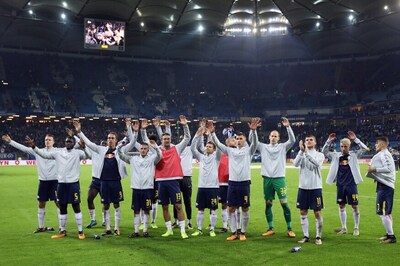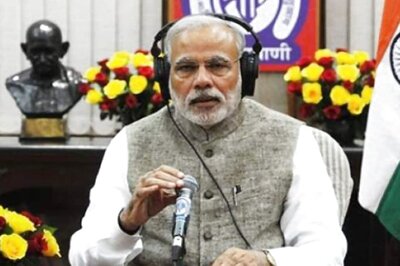
views
New Delhi: Filmmaker Prakash Jha is no stranger to controversies, but his upcoming film 'Aarakshan' threatens to rekindle a bitter debate on an issue that has in past driven a wedge between some of India's most sharply defined classes traditionally exploited for votebank politics.
Former royal, Saif Ali Khan, the son of the erstwhile Nawab of Pataudi, plays the role of a Dalit teacher in the film that takes a hard look at India's reservation policies and brings the focus back on a subject that has been the thorn in the side of successive governments as they struggled to balance a popular vote bank with policy implementation and social democracy.
Aarakshan has run into troubled waters with a spate of protests across India against Jha's perceived anti-quota stance. But the filmmaker has repeatedly maintained that his film strives to show both sides of the issue which has sparked extreme emotions among both the middleclass and the "backward" classes.
But the first relief for the producers of Aarakshan came with the Bombay High Court declining to stay the release of the film and rejecting a petition by two advocates demanding a special screening of the movie before its release. The court posted an August 22 date for further hearing in the case. But the film would have been released by then.
The issue that divides India
The Constitution requires 22.5 per cent of government jobs and government-funded educational institutions to be reserved for the socially backward communities. At the time the political thinkers attempted to safeguard the interests of India's long oppressed "untouchables" and ensure their holistic growth along with the nation’s newly scripted social, democratic agenda.
The Mandal Commission in the 1980s, entrusted by the Janata Party government led by Prime Minister Morarji Desai to identify socially backward classes and look into seat reservation for them in educations and jobs, endorsed the existing affirmative action programme and recommended that Other Backward Classes be given exclusive access to a certain portion of government jobs and slots in central educational institutions, and recommended increasing the quota by 27 per cent to 49.5 per cent.
Affirmative action refers to policies that take factors including race, color, religion, gender, sexual orientation or national origin into consideration in order to benefit an underrepresented group, usually as a means to counter the effects of a history of discrimination.
The Mandal Commission report was met with a string of violent protests and several self-immolation bids by students of so called upper castes, who stood to lose, as subsequent governments tried to implement the recommendations.
In 2006, Parliament passed the 104th Constitution Amendment Bill, providing for reservations for the socially and educationally backward classes, besides the Scheduled Classes and Scheduled Tribes, in all private aided and unaided educational institutions.
The Supreme Court of India in 2008 upheld the Government's move for initiating 27 per cent OBC quotas in government-funded institutions. The Court said that the "creamy layer" should be excluded from the ambit of reservation policy. But reservation in private educational institutions, seen as the recourse of the wealthy and dealt with in Jha's Aarakshan, still remains a contentious subject.
Politics of reservation
The film has run into trouble with several political leaders including Chhagan Bhujbal of NCP and Republican Party of India (RPI) chief Ramdas Athavale. Surinder Dhanda, President of Ambedkar Sena and a host of other activists presented a memorandum, addressed to the Punjab Chief Minister, to the local SDM Manpreet Singh demanding a ban on the film’s release.
The threats of pro-reservation activists may scare cinema houses and multiplex owners into canceling the screening of the film.
But the road to the affirmative action programme has been continually obstructed with political exploitation of socially and educationally backward classes on one hand and the upper class' violent opposition to quota in higher educational institutions.
The 2006 amendment was approved while the Congress was in power to bring back a predominantly tribal, Dalit and OBC voters who had moved away since the emergence of powerful regional parties.
Getting past the Censor Board
Jha showed his film to a nine-member panel of Censor Board members who apparently cleared it without any cuts and given it a U/A certificate. Censor Board Chairperson Leela Sampon has assured that the film's release will be deferred. But the National Commission for Scheduled Castes and Scheduled Tribes has demanded that some scenes which have the potential to threaten national harmony and peace be censored and the film released with the cuts.
The Indian censor board, that vets films on sensitive subjects, has in past cleared controversial cinema that throws light on social issues. Controversial filmmaker Qaushik's short film 'That Boy' despite having violent imageries was passed with a U/A certificate. So was his 'Bishh' and National Award winning documentary 'Love in India' that explored the inherent Indian curiosity with love and sex.
While the film 'Gulabi Aaina' on Indian transsexuals, won critics’ approval across the world at film festivals, it was banned in 2003 for being "vulgar and offensive". The 2004 documentary Final Solution on rioting between Hindus and Muslims in Gujarat met with a similar fate. A dialogue here, a scene there; filmmakers who have a run-in with the censors know how the system works. Aarakshan wasn't a hard-sell for the censors.
Though the National Commission for Minorities and National Commission for Scheduled Castes and Scheduled Tribes sought a special screening to confirm the film did not misinterpret the constitutional provision for socially backward classes, the censor board examining committee comprising representatives from the Dalit, OBC, SC and ST community and agreed to clear it.
The film
Aarakshan, scheduled to be released on August 12, stars Amitabh Bachchan, Deepika Padukone, Manoj Bajpayee and Prateik Babbar. Bachchan plays the principal of a private college and Saif Ali Khan plays a Dalit student romancing Bachchan's daughter (Deepika) in the film. Set in Bhopal, the film is a documentation of events post the SC judgment of 2008.




















Comments
0 comment